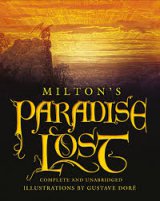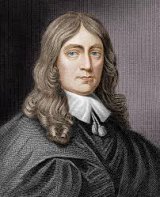Paradise Lost Page #5
Paradise Lost is an epic poem in blank verse by the 17th-century English poet John Milton. The first version, published in 1667, consisted of ten books with over ten thousand lines of verse. A second edition followed in 1674, arranged into twelve books with minor revisions throughout and a note on the versification.
He spake: and to confirm his words, out-flew Millions of flaming swords, drawn from the thighs Of mighty Cherubim; the sudden blaze Far round illumin’d hell: highly they rag’d Against the Highest, and fierce with grasped arm’s Clash’d on their sounding shields the din of war, Hurling defiance toward the vault of Heav’n. There stood a Hill not far whose griesly top Belch’d fire and rowling smoak; the rest entire Shon with a glossie scurff, undoubted sign That in his womb was hid metallic Ore, The work of Sulphur. Thither wing’d with speed A numerous Brigad hasten’d. As when bands Of Pioners with Spade and Pickaxe arm’d Forerun the Royal Camp, to trench a Field, Or cast a Rampart. Mammon led them on, Mammon, the least erected Spirit that fell From heav’n, for ev’n in heav’n his looks & thoughts Were always downward bent, admiring more The riches of Heav’ns pavement, trod’n Gold, Then aught divine or holy else enjoy’d In vision beatific: by him first Men also, and by his suggestion taught, Ransack’d the Center, and with impious hands Rifl’d the bowels of thir mother Earth For Treasures better hid. Soon had his crew Op’nd into the Hill a spacious wound And dig’d out ribs of Gold. Let none admire That riches grow in Hell; that soyle may best Deserve the pretious bane. And here let those Who boast in mortal things, and wondring tell Of Babel, and the works of Memphian Kings, Learn how thir greatest Monuments of Fame, And Strength and Art are easily outdone By Spirits reprobate, and in an hour What in an age they with incessant toyle And hands innumerable scarce perform Nigh on the Plain in many cells prepar’d, That underneath had veins of liquid fire Sluc’d from the Lake, a second multitude With wondrous Art founded the massie Ore, Severing each kinde, and scum’d the Bullion dross: A third as soon had form’d within the ground A various mould, and from the boyling cells By strange conveyance fill’d each hollow nook, As in an Organ from one blast of wind To many a row of Pipes the sound-board breaths. Anon out of the earth a Fabrick huge Rose like an Exhalation, with the sound Of Dulcet Symphonies and voices sweet, Built like a Temple, where Pilasters round Were set, and Doric pillars overlaid With Golden Architrave; nor did there want Cornice or Freeze, with bossy Sculptures grav’n, The Roof was fretted Gold. Not Babilon, Nor great Alcairo such magnificence Equal’d in all thir glories, to inshrine Belus or Serapis thir Gods, or seat Thir Kings, when Aegypt with Assyria strove In wealth and luxurie. Th’ ascending pile Stood fixt her stately highth, and strait the dores Op’ning thir brazen foulds discover wide Within, her ample spaces, o’re the smooth And level pavement: from the arched roof Pendant by suttle Magic many a row Of Starry Lamps and blazing Cressets fed With Naphtha and Asphaltus yeilded light As from a sky. The hasty multitude Admiring enter’d, and the work some praise And some the Architect: his hand was known In Heav’n by many a Towred structure high, Where Scepter’d Angels held thir residence, And sat as Princes, whom the supreme King Exalted to such power, and gave to rule, Each in his Herarchie, the Orders bright. Nor was his name unheard or unador’d In ancient Greece; and in Ausonian land Men call’d him Mulciber; and how he fell From Heav’n, they fabl’d, thrown by angry Jove Sheer o’re the Chrystal Battlements: from Morn To Noon he fell, from Noon to dewy Eve, A Summers day; and with the setting Sun Dropt from the Zenith like a falling Star, On Lemnos th’ Aegaean Ile: thus they relate, Erring; for he with this rebellious rout Fell long before; nor aught avail’d him now To have built in Heav’n high Towrs; nor did he scape By all his Engins, but was headlong sent With his industrious crew to build in hell. Mean while the winged Haralds by command Of Sovran power, with awful Ceremony And Trumpets sound throughout the Host proclaim A solemn Councel forthwith to be held At Pandaemonium, the high Capital Of Satan and his Peers: thir summons call’d From every and Band squared Regiment By place or choice the worthiest; they anon With hundreds and with thousands trooping came Attended: all access was throng’d, the Gates And Porches wide, but chief the spacious Hall (Though like a cover’d field, where Champions bold Wont ride in arm’d, and at the Soldans chair Defi’d the best of Panim chivalry To mortal combat or carreer with Lance) Thick swarm’d, both on the ground and in the air, Brusht with the hiss of russling wings. As Bees In spring time, when the Sun with Taurus rides, Poure forth thir populous youth about the Hive In clusters; they among fresh dews and flowers Flie to and fro, or on the smoothed Plank, The suburb of thir Straw-built Cittadel, New rub’d with Baume, expatiate and confer Thir State affairs. So thick the aerie crowd Swarm’d and were straitn’d; till the Signal giv’n, Behold a wonder! they but now who seemd In bigness to surpass Earths Giant Sons Now less then smallest Dwarfs, in narrow room Throng numberless, like that Pigmean Race Beyond the Indian Mount, or Faerie Elves, Whose midnight Revels, by a Forrest side Or Fountain fome belated Peasant sees, Or dreams he sees, while over head the Moon Sits Arbitress, and neerer to the Earth Wheels her pale course, they on thir mirth & dance Intent, with jocond Music charm his ear; At once with joy and fear his heart rebounds. Thus incorporeal Spirits to smallest forms Reduc’d thir shapes immense, and were at large, Though without number still amidst the Hall Of that infernal Court. But far within And in thir own dimensions like themselves The great Seraphic Lords and Cherubim In close recess and secret conclave sat A thousand Demy-Gods on golden seat’s, Frequent and full. After short silence then And summons read, the great consult began. THE END OF THE FIRST BOOK. PARADISE LOST BOOK II. High on a Throne of Royal State, which far Outshon the wealth of Ormus and of Ind, Or where the gorgeous East with richest hand Showrs on her Kings Barbaric Pearl & Gold, Satan exalted sat, by merit rais’d To that bad eminence; and from despair Thus high uplifted beyond hope, aspires Beyond thus high, insatiate to pursue Vain Warr with Heav’n, and by success untaught His proud imaginations thus displaid. Powers and Dominions, Deities of Heav’n, For since no deep within her gulf can hold Immortal vigor, though opprest and fall’n, I give not Heav’n for lost. From this descent Celestial vertues rising, will appear More glorious and more dread then from no fall, And trust themselves to fear no second fate: Mee though just right, and the fixt Laws of Heav’n Did first create your Leader, next, free choice, With what besides, in Counsel or in Fight, Hath bin achievd of merit, yet this loss Thus farr at least recover’d, hath much more Establisht in a safe unenvied Throne Yeilded with full consent. The happier state In Heav’n, which follows dignity, might draw Envy from each inferior; but who here Will envy whom the highest place exposes Formost to stand against the Thunderers aime Your bulwark, and condemns to greatest share Of endless pain? where there is then no good For which to strive, no strife can grow up there From Faction; for none sure will claim in hell Precedence, none, whose portion is so small Of present pain, that with ambitious mind Will covet more. With this advantage then To union, and firm Faith, and firm accord, More then can be in Heav’n, we now return To claim our just inheritance of old, Surer to prosper then prosperity Could have assur’d us; and by what best way, Whether of open Warr or covert guile, We now debate; who can advise, may speak.
Translation
Translate and read this book in other languages:
Select another language:
- - Select -
- 简体中文 (Chinese - Simplified)
- 繁體中文 (Chinese - Traditional)
- Español (Spanish)
- Esperanto (Esperanto)
- 日本語 (Japanese)
- Português (Portuguese)
- Deutsch (German)
- العربية (Arabic)
- Français (French)
- Русский (Russian)
- ಕನ್ನಡ (Kannada)
- 한국어 (Korean)
- עברית (Hebrew)
- Gaeilge (Irish)
- Українська (Ukrainian)
- اردو (Urdu)
- Magyar (Hungarian)
- मानक हिन्दी (Hindi)
- Indonesia (Indonesian)
- Italiano (Italian)
- தமிழ் (Tamil)
- Türkçe (Turkish)
- తెలుగు (Telugu)
- ภาษาไทย (Thai)
- Tiếng Việt (Vietnamese)
- Čeština (Czech)
- Polski (Polish)
- Bahasa Indonesia (Indonesian)
- Românește (Romanian)
- Nederlands (Dutch)
- Ελληνικά (Greek)
- Latinum (Latin)
- Svenska (Swedish)
- Dansk (Danish)
- Suomi (Finnish)
- فارسی (Persian)
- ייִדיש (Yiddish)
- հայերեն (Armenian)
- Norsk (Norwegian)
- English (English)
Citation
Use the citation below to add this book to your bibliography:
Style:MLAChicagoAPA
"Paradise Lost Books." Literature.com. STANDS4 LLC, 2025. Web. 7 Jan. 2025. <https://www.literature.com/book/paradise_lost_101>.




Discuss this Paradise Lost book with the community:
Report Comment
We're doing our best to make sure our content is useful, accurate and safe.
If by any chance you spot an inappropriate comment while navigating through our website please use this form to let us know, and we'll take care of it shortly.
Attachment
You need to be logged in to favorite.
Log In